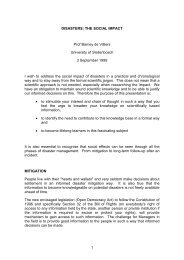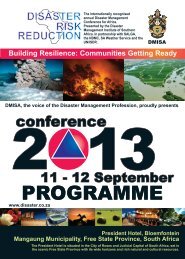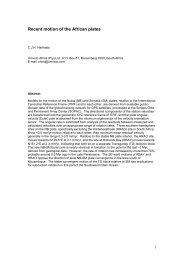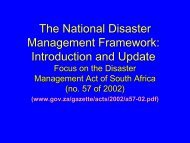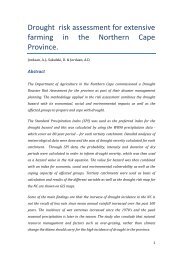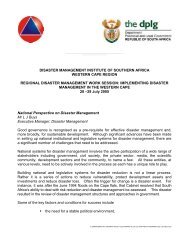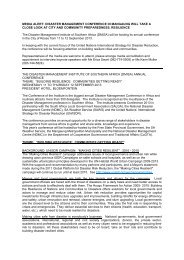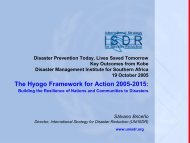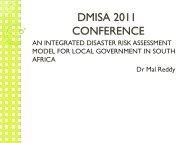BS Ngcamu, Dr. N Dorasamy - Disaster Management Institute South ...
BS Ngcamu, Dr. N Dorasamy - Disaster Management Institute South ...
BS Ngcamu, Dr. N Dorasamy - Disaster Management Institute South ...
- No tags were found...
Create successful ePaper yourself
Turn your PDF publications into a flip-book with our unique Google optimized e-Paper software.
Emergency response planning deals with how the municipality will help its clients cope with theextraordinary demands that a disaster creates. In contrast, business continuity planning deals withhow the municipality copes with the impact of the disaster with its own systems and resources(Manitoba Health Department, 2002:30).Another component of response preparedness is to bring the skills, knowledge, functions andsystems together and apply them against event scenarios (Manitoba Health Department, 2002:31).This means that all government departments and different stakeholders should meet and integratetheir knowledge and expertise in preparation for any catastrophe. Furthermore, private and publicorganisations should prepare their internal disaster management pro-active plans with the aim ofavoiding or mitigating any risk or disaster. The recent earthquake that devasted Haiti resulted in anestimated 230 000 deaths with many more people left injured and displaced. The tragic situation inHaiti has raised key issues on the preparedness of <strong>South</strong> Africa’s disaster management departmentsin dealing with these catastrophies, particularly at the municipality level.In the <strong>South</strong> African context, the term ‘disaster risk management’ refers to the integrated, multisectoraland multidisciplinary administrative, organisational, and operational planning processes aswell as capacities aimed at lessening the impact of natural hazards and related environmental,technological and biological disasters. According to the <strong>South</strong> African <strong>Disaster</strong> <strong>Management</strong> Act2002 (57 of 2002), disaster management means a continuous and integrated multi-sectoral, multidisciplinaryprocess of planning and implementation of measures aimed at preventing or reducingthe risk of disasters, mitigating the severity or consequences of disasters, emergency preparedness, arapid and effective response to disasters and post-disaster recovery and rehabilitation. However, theterms disaster risk management and disaster management are used interchangeably in this article(NDMC, 2006/2007:12).The <strong>Disaster</strong> <strong>Management</strong> Act 2002 (Act 57 of 2002) gives priority to the application of theprinciple of cooperative governance for the purpose of disaster risk management and emphasizesthe involvement of all stakeholders in strengthening the capabilities of national, provincial andmunicipal organs of state to reduce the likehood and severity of disasters. The Department ofAgriculture has rolled out an awareness programme to raise awareness and educate farmingcommunities about disaster risk-reduction principles. Furthermore, the department issues earlywarning information (National Airways Corporation monthly advisories) and daily extreme weather8



